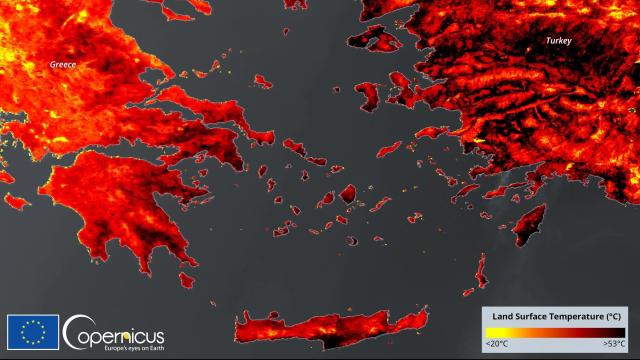Wildfires are raging out of control amid blistering heat in Turkey and Greece. New data shows that ground temperatures in parts of Greece and Turkey reached more than 53 degrees Celsius on Tuesday.
The temperatures were recorded by Copernicus’s Sentinel 3 satellite, part of the European Union’s Earth Observation Program. Copernicus released a colour-coded heat map of land surface temperatures in the two countries showing how severe things are. Much of the map is covered in deep red and black, indicating widespread ground temperatures that would burn your feet.
The highs in Greece and Turkey add to a worrying trend of sky-high ground temperatures in areas that have seen extreme heat this summer. In late June, ground temperatures in Washington State hit a jaw-dropping 63 degrees Celsius during the Pacific Northwest heat wave. Ground temperatures in the Arctic Circle, of all places, hit 48 degrees Celsius earlier that month. The latter is an extra worrisome figure, since the permafrost in that region stores so much methane and such extreme heat could cause the frozen soil to thaw.
Ground that hot can also be a public health hazard as well; hot pavement can also cause serious burns and injuries for people who come in contact with it. Sizzling surface temperatures can also buckle roads and damage other critical infrastructure.
It’s important to note that ground surface temperatures are not the same as air temperatures, which are our normal barometer for gauging just how hot a place actually is. Surface temperatures tend to be higher because heat can more easily dissipate in air. But that said, air temperatures in the Mediterranean haven’t offered much relief.
Turkey hit an all-time air temperature high of 49.1 degrees Celsius in July; Antalya, a tourist destination that has been barraged by wildfires, has consistently logged temperatures above 40 degrees Celsius in recent days. Greece, meanwhile, saw its own national high of 46.3 degrees Celsius on Tuesday.
“We are facing the worst heat wave since 1987,” Greek Prime Minister Kyriakos Mitsotakis told the New York Times on Monday. Mitsotakis added that the government was doing “everything humanly possible” to make sure electricity did not go out.
The too-hot air and ground temperatures are a worrying sign of the impact of the climate crisis. The two countries are suffering through a devastating heat wave coupled with a serious drought. Wildfires have burned for nearly a week in Turkey, killing at least eight people and forcing thousands to evacuate. The government has made an international call for help to battle the remaining seven fires still raging. Data shows three times as many fires as usual have already burned in Turkey this year.
The region is expected to remain abnormally hot over the coming days, ensuring more unnervingly high ground temperatures as well. As with the Pacific Northwest heat wave, which was made 150 times more likely due to climate change, the current suffering in the eastern Mediterranean is almost certainly being made worse by carbon pollution from burning fossil fuels.
“Every heat wave that is happening today is made more likely and more intense by climate change,” Friederike Otto, associate director of the Environmental Change Institute at University of Oxford, and a lead author of the upcoming Intergovernmental Panel on Climate Change report, told Politico.
